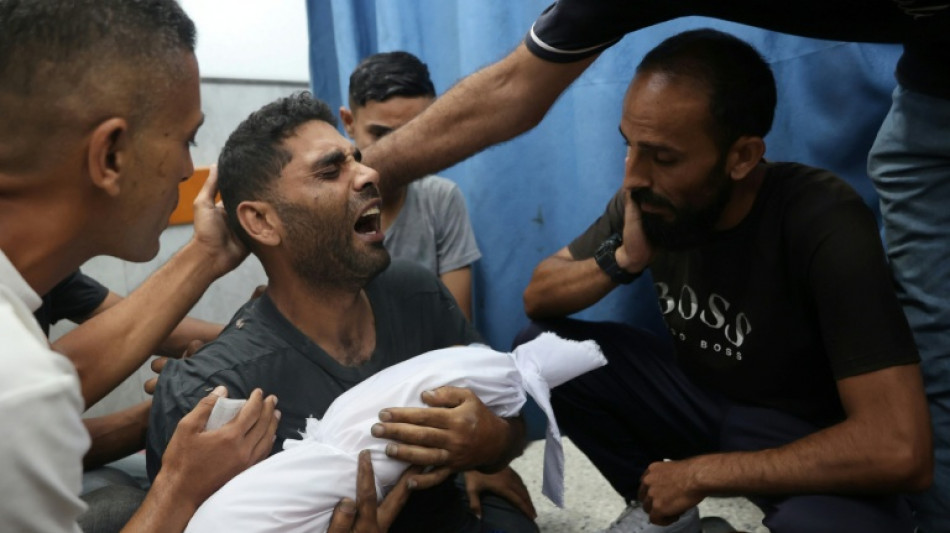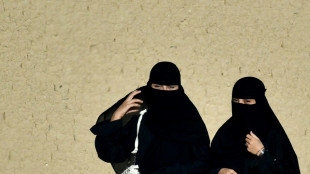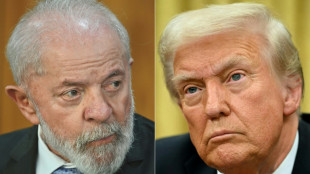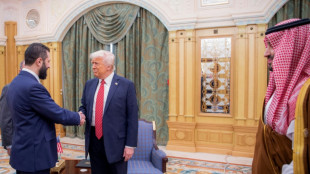
Trump to meet Netanyahu in push for Gaza deal

US President Donald Trump hosts Israeli Prime Minister Benjamin Netanyahu on Monday to push for an end to the Gaza war, after Israel and Hamas held indirect talks in Qatar on an elusive ceasefire.
Trump has said he believes there is a "good chance" of an agreement this week for a ceasefire in the devastated Palestinian territory, hot on the heels of a truce in the war between Israel and Iran.
The US president -- who has expressed increasing concern over the situation in Gaza in recent weeks -- will have dinner behind closed doors with Netanyahu, their third meeting since Trump returned to power.
White House spokesperson Karoline Leavitt said it was Trump's "utmost priority... to end the war in Gaza and to return all of the hostages."
Leavitt said Trump wanted Hamas to agree to a US-brokered proposal "right now" after Israel backed the plan for a ceasefire and the release of hostages held in Gaza in exchange for Palestinian prisoners.
The latest round of negotiations on the war in Gaza began on Sunday in Doha, with representatives seated in different rooms in the same building.
A second session was held on Monday and ended with "no breakthrough," a Palestinian official familiar with the negotiations told AFP.
The Hamas and Israeli delegations were due to resume talks later on Monday, the official said.
- 'Good chance' -
Trump's special envoy Steve Witkoff was due to join the talks in Doha later this week in an effort to get a ceasefire over the line as the Gaza conflict nears its 22nd month.
In Washington, key US ally Netanyahu was to hold separate meetings with Witkoff and Secretary of State Marco Rubio before his dinner with Trump at 6:30 pm local time (2230 GMT).
Netanyahu, speaking before heading to Washington, said his meeting with Trump could "definitely help advance" a deal with Hamas.
Trump said on Sunday that there was a "good chance we have a deal with Hamas... during the coming week".
He added that during his talks with Netanyahu he wanted to discuss a "permanent deal" with Iran, following a truce with Israel that was precipitated by US strikes on Iranian nuclear sites.
But the talks in both Washington and Doha promise to be tense.
Netanyahu previously said Hamas's initial response to the draft ceasefire proposal contained "unacceptable" demands.
The proposal included a 60-day truce, during which Hamas would release 10 living hostages and several bodies in exchange for Palestinians detained by Israel, two Palestinian sources close to the discussions had earlier told AFP.
But the group was also demanding certain conditions for Israel's withdrawal, guarantees against a resumption of fighting during negotiations, and the return of the UN-led aid distribution system, they said.
- 'End the war' -
In Israel's coastal hub of Tel Aviv, hours before the meeting, dozens of people including relatives of hostages demonstrated to demand the release of the remaining captives.
"President Trump -- make history. Bring them all home. End the war," read a sign held by protesters outside the US diplomatic mission in the city.
Of the 251 hostages taken by Palestinian militants during the Hamas attack that triggered the war, 49 are still being held in Gaza, including 27 the Israeli military says are dead.
Two previous ceasefires have broken down and efforts to broker a new truce have repeatedly failed, with the primary point of contention being Israel's rejection of Hamas's demand for a lasting ceasefire.
In Gaza, the civil defence agency said Israeli forces killed at least 12 people on Monday, including six in a clinic housing people displaced by the war.
The war has created dire humanitarian conditions for the more than two million people in the Gaza Strip.
The rollout of food distribution by a US- and Israel-backed group in late May has been chaotic, with more than 500 aid seekers killed near its facilities, according to the UN Human Rights Office.
Hamas's October 2023 attack resulted in the deaths of 1,219 people, mostly civilians, according to an AFP tally based on Israeli official figures.
Israel's retaliatory campaign has killed at least 57,523 people in Gaza, also mostly civilians, according to the Hamas-run territory's health ministry. The UN considers the figures reliable.
It has also reduced much of the enclave to rubble, destroying schools, hospitals and residential areas, and severely restricted the entry of aid.
burs-dk/aha
B.Cote--SMC


 London
London

 Manchester
Manchester
 Glasgow
Glasgow
 Dublin
Dublin
 Belfast
Belfast
 Washington
Washington
 Denver
Denver
 Atlanta
Atlanta
 Dallas
Dallas
 Houston Texas
Houston Texas
 New Orleans
New Orleans
 El Paso
El Paso
 Phoenix
Phoenix
 Los Angeles
Los Angeles


